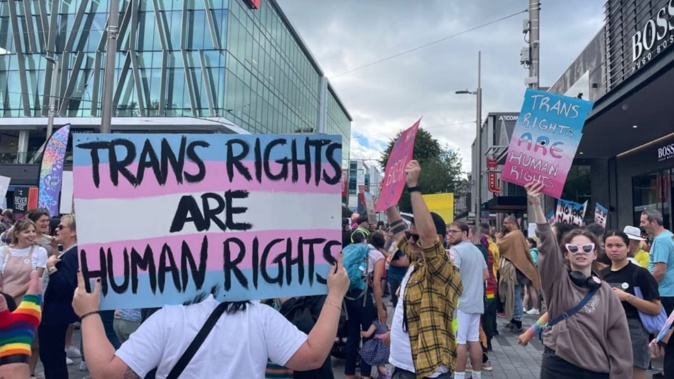
“What is a woman?”
It’s a question often asked to coax an unsuspecting politician into a “gotcha” moment - one that some believe beckons a black-and-white response.
“New Zealand PM struggles when asked ‘what is a woman?’” reads the title of a 2023 Sky News video of Chris Hipkins. After a long pause and a confused expression, he replied: “People define themselves. People define their own genders.”
The question came as a result of then Labour Party leader Sir Keir Starmer telling the Sunday Times that “for 99.9% of women, it is completely biological... and of course they haven’t got a penis.”
Now the UK’s Prime Minister, Starmer’s position has changed. He said the UK Supreme Court had “made it absolutely clear” that a woman was an adult female.
The court has ruled that a woman is defined by “biological sex” under their equality law.
The court sided with a women’s rights campaign group that argued sex-based protections should only apply to “people who were born female”. Judge Lord Hodge said the ruling should not be seen as a triumph of one side over the other, and stressed that the law still gives protection against discrimination to transgender people.
Outside the court, champagne was popped and cheers rang throughout a crowd praising the decision as a “win for women”. On the other hand, trans rights activists have called it a huge blow to some of society’s most marginalised people.
New Zealand First has since introduced a member’s bill that “would ensure the biological definition of a woman and man are defined in law”.
But can such a move be translated here?
Sex vs gender
University of Waikato professor of sociology and social policy, Katrina Roen, told The Front Page the desire to define a woman is driven by the belief there are just two sexes, and that’s simply not the case.
" Gender expression is something that can be explored throughout one’s lifetime. It doesn’t have to fit into a fixed category at all. It might change over the course of time.
“In terms of gender theory and research, since the 1970s, there’s been a very clear division between concepts of gender and sex.
“It’s often explained that gender relates to identity, how we identify, how we express ourselves. Gender roles might be a familiar concept. While sex relates to the sex body, sex anatomy, and sex characteristics. If we think of gender as social and sex as biological, that could be one way of understanding the difference,” she said.
Roen said since about the 1990s, it’s been more understood that both gender and sex have a socially constructed aspect to them.
“As a society, we might construct gender as being binary, as just being ‘woman’ and ‘man’. We might construct sex as being binary, as just being ‘male bodies’ and ‘female bodies’. But, research recognises very clearly now that’s simply not the case. There isn’t a clear binary except in the social construction.
“For example, in sex bodies, we see a whole spectrum of possibilities of sexes, not just two. We see all kinds of variations of sex characteristics, and these are being talked about much more widely.
“Intersex refers to variations in sex characteristics. It refers to the way that the body naturally develops as having sex characteristics that aren’t necessarily male or female.
“For instance, we might have been taught that women have XX chromosomes and men have XY chromosomes. Well, it’s simply not true that the whole population either has XX or XY chromosomes. There is a range of alternatives,” she said.
In New Zealand
When it comes to trans rights in New Zealand, Section 21 of the Human Rights Act 1993 lists the prohibited grounds of discrimination, including sex and sexual orientation. The Government has considered that the ground of “sex” includes people who are transgender.
In 2006, then Attorney-General Michael Cullen released a Crown Law opinion in response to a private member’s bill introduced by then Labour MP Georgina Beyer.
Beyer, the world’s first openly transgender mayor and member of Parliament, sought to have transgender people protected “the same way all other New Zealanders are protected”.
Cullen said that opinion suggested trans people would be covered by clauses in the Act - something that led Beyer to withdraw her bill, saying “until now there was no authority supporting this view”.
However, later consultation with the community found concerns about protections needing to be more explicit by adding gender identity, gender expression, and sex characteristics as prohibited grounds for discrimination.
The Law Commission is currently examining the protections in the Human Rights Act for people who are transgender, non-binary, and those who have an innate variation of sex characteristics.
The project, called Ia Tangata, is reviewing the current legislation, which does not contain the term “gender”, nor related terms such as “gender identity” or “gender expression”. It also does not contain the term “intersex”.
It is looking into whether it should be amended.
Roan said New Zealand has a different attitude towards trans and gender rights as a whole, so she doesn’t think these views could or should be brought to our shores.
“Things like research into identity, Māori understandings of gender and sexuality, and sex diversity. All of these things really are recognised internationally as something that New Zealand does that is special and extraordinary, and worthwhile.
“So, it would be a real step back for us if we tried to follow in the footsteps of either the US or UK and the directions that they’re currently going,” she said.
Listen to the full episode to hear more about gender, sex, and whether common ground can be reached.
The Front Page is a daily news podcast from the New Zealand Herald, available to listen to every weekday from 5am. The podcast is presented by Chelsea Daniels, an Auckland-based journalist with a background in world news and crime/justice reporting who joined NZME in 2016.
You can follow the podcast at iHeartRadio, Apple Podcasts, Spotify, or wherever you get your podcasts.
Take your Radio, Podcasts and Music with you









